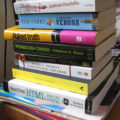An Internet meme I’ve been meaning to get to for a bit:
“Below is a Science Fiction Book Club list most significant SF novels between 1953-2006. The meme part of this works like so: Bold the ones you have read, strike through the ones you read and hated, italicize those you started but never finished and put a star next to the ones you love.”
1. The Lord of the Rings*, J.R.R. Tolkien (Read many times, though I always said the girls weren’t having enough fun. Now I like the movies better.)
2. The Foundation Trilogy, Isaac Asimov
3. Dune, Frank Herbert (Read the first one, wasn’t impressed, though the discomfort of stillsuits is still vivid in my mind.)
4. Stranger in a Strange Land*, Robert A. Heinlein (I was crazy about Heinlein in high school – I think it’s a phase a lot of kids go through. But I preferred “I Will Fear No Evil”)
5. A Wizard of Earthsea*, Ursula K. Le Guin
6. Neuromancer, William Gibson (One Gibson was enough for me – too pessimistic, no sense of humor.)
7. Childhood’s End*, Arthur C. Clarke (I read this over and over again in Bangladesh, partly because I didn’t have many books. The ending creeped me out every time.)
8. Do Androids Dream of Electric Sheep?*, Philip K. Dick (Read it in high school, need to read it again. Very different from the movie.)
9. The Mists of Avalon*, Marion Zimmer Bradley (Though in the Arthurian vein I prefer Mary Stewart.)
10. Fahrenheit 451*, Ray Bradbury
11. The Book of the New Sun, Gene Wolfe
12. A Canticle for Leibowitz*, Walter M. Miller, Jr.
13. The Caves of Steel, Isaac Asimov
14. Children of the Atom, Wilmar Shiras
15. Cities in Flight, James Blish
16. The Colour of Magic, Terry Pratchett
17. Dangerous Visions*, edited by Harlan Ellison
18. Deathbird Stories, Harlan Ellison
19. The Demolished Man, Alfred Bester
20. Dhalgren, Samuel R. Delany
21. Dragonflight*, Anne McCaffrey (One of my all-time favorites from age 12.)
22. Ender’s Game, Orson Scott Card
23. The First Chronicles of Thomas Covenant the Unbeliever, Stephen R. Donaldson (Didn’t care for these; “The Mirror of Her Dreams” is much better.)
24. The Forever War, Joe Haldeman
25. Gateway, Frederik Pohl
26. Harry Potter and the Philosopher’s Stone*, J.K. Rowling
27. The Hitchhiker’s Guide to the Galaxy, Douglas Adams*
28. I Am Legend*, Richard Matheson
29. Interview with the Vampire, Anne Rice (Well, of course.)
30. The Left Hand of Darkness, Ursula K. Le Guin*
31. Little, Big*, John Crowley
32. Lord of Light*, Roger Zelazny
33. The Man in the High Castle, Philip K. Dick
34. Mission of Gravity, Hal Clement
35. More Than Human, Theodore Sturgeon
36. The Rediscovery of Man, Cordwainer Smith*
37. On the Beach, Nevil Shute
38. Rendezvous with Rama, Arthur C. Clarke
39. Ringworld, Larry Niven
40. Rogue Moon, Algis Budrys
41. The Silmarillion, J.R.R. Tolkien
42. Slaughterhouse-5, Kurt Vonnegut
43. Snow Crash*, Neal Stephenson
44. Stand on Zanzibar*, John Brunner (Preferred his “The Shockwave Rider” – has some lessons for today, I think.)
45. The Stars My Destination, Alfred Bester
46. Starship Troopers, Robert A. Heinlein
47. Stormbringer, Michael Moorcock
48. The Sword of Shannara, Terry Brooks
49. Timescape, Gregory Benford
50. To Your Scattered Bodies Go, Philip Jose Farmer
Wait on – what the hell happened to Brin and Spinrad? How could they not be on this list? And Ted Chiang?
“And a similar meme surrounding female sf/f writers:”
Margaret Atwood (The Handmaid’s Tale)*
Diana Wynne Jones (Everything she’s ever written – and I haven’t read nearly all of it. Original, funny.)
Vonda McIntyre (One great book that I know of – Dreamsnake. After that?)
Robin McKinley (Nowadays my favorite fantasy author.)
Connie Willis (Excellent.)






